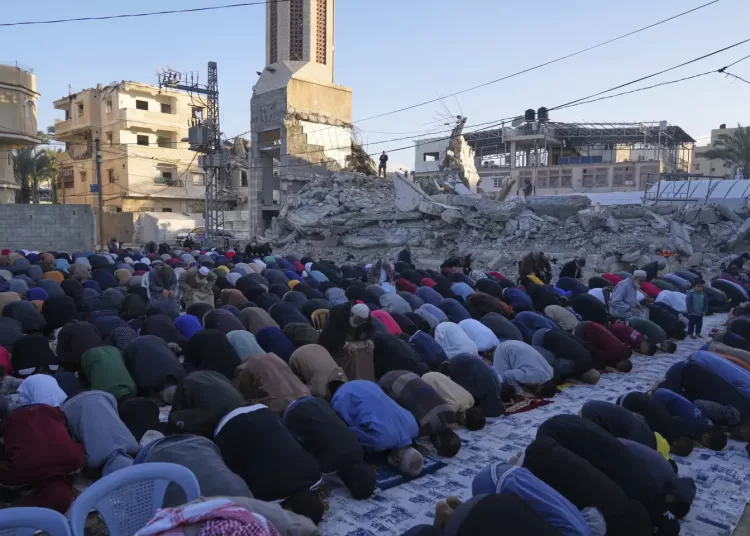Palestinians in the Gaza Strip had little to celebrate on Sunday as they began marking a normally festive Muslim holiday with rapidly dwindling food supplies and no end in sight to the Israel-Hamas war. Israeli strikes overnight into Sunday killed at least 19 people, mostly women and children, health officials said.
Many held prayers outside demolished mosques on the Eid al-Fitr holiday marking the end of the fasting month of Ramadan. It’s supposed to be a joyous occasion, when families gather for feasts and purchase new clothes for children — but most of Gaza’s 2 million Palestinians are just trying to survive.
“It’s the Eid of sadness,” Adel al-Shaer said after attending outdoor prayers in the central town of Deir al-Balah. “We lost our loved ones, our children, our lives, and our futures. We lost our students, our schools, and our institutions. We lost everything.”
Twenty members of his extended family have been killed in Israeli strikes, including four young nephews just a few days ago, he said as he broke into tears.
Israel ended the ceasefire with Hamas and resumed the 17-month war earlier this month when Hamas refused to accept changes to the agreement reached in January. Israeli strikes have killed hundreds of Palestinians, and Israel has allowed no food, fuel or humanitarian aid to enter for four weeks.
Arab mediators are trying to get the truce back on track, and Hamas said Saturday that it had accepted a new proposal from Egypt and Qatar, the exact details of which were not immediately known. Israel said it had advanced its own proposal in coordination with the United States, which has also been mediating.
Israeli strikes on Sunday killed at least 16 people, including nine children and three women, according to Nasser Hospital in the southern city of Khan Younis. Two of the children, young girls, appeared to be wearing new clothes purchased for the holiday, according to an Associated Press cameraman.
Another three people were killed in a strike in Deir al-Balah late Saturday, according to Al-Aqsa Martyrs Hospital.
“There is killing, displacement, hunger, and a siege,” said Saed al-Kourd, a worshipper. “We go out to perform God’s rituals in order to make the children happy, but as for the joy of Eid? There is no Eid.”
The war began when Hamas-led militants stormed into Israel on Oct. 7, 2023, killing some 1,200 people, mostly civilians, and taking 251 hostages. Hamas is still holding 59 captives — 24 of whom are believed to be alive — after most of the rest were released in ceasefires or other agreements.
Israel’s offensive has killed over 50,000 Palestinians, according to Gaza’s Health Ministry, which does not distinguish between civilians and combatants in its tally. Israel says it has killed around 20,000 without providing evidence, and blames civilian deaths on Hamas because it operates in densely populated areas.
Israel’s bombardment and ground operations have destroyed vast areas of Gaza and at their height had displaced around 90% of the population.





